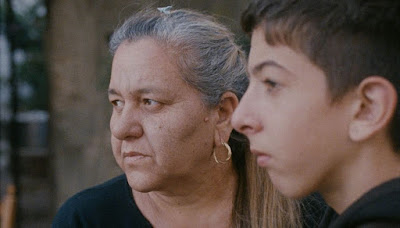Laden with awards and nominations -- from international festivals and in its own country of Italy via the David Di Donatellos, the Italian version of our "Oscars" -- and also greeted with enthusiasm when it opened theatrically here in the USA earlier this year, A CIAMBRA (so named for an unfinished housing development and neighborhood, shown two photos below, occupied for some years now by a community of Romani people in the Calabria region of Southern Italy) is a hybrid documentary-style narrative film in which an enormous (and real) Romani family, all playing themselves, help tell the tale of one of its younger members, a teenager named Pio, who wants more than anything to become a criminal just like his weirdly adored older asshole brother.
As written and directed by Jonas Campignano (shown at right, of Mediterranea), the movie fairly reeks of reality. You could not ask for anything more "honest" -- from the performances (not simply "warts and all" but "warts and more warts") to the screenplay and dialog (which is noticeably sparse and seems quite believable) and direction and camera-work (by Tim Curtin) that could hardly be more immersive and on-the-mark.
The movie shows us the plight of the Romani in Italy as third-class (if that) citizens, barely a cut above -- in the eyes of the "real" Italians -- those black African immigrants who also flood the area. A Ciambra neither glamorizes nor in any way idealizes its protagonists; in fact, it shows them to be, in many cases, their own worst enemy -- dreaming of a more "romantic," on-the-move past, while doing little (except theft) to address the needs of the present, let alone the future.
And yet the movie itself is paced so slowly, with a plot as obvious and predictable in its own way as any Hollywood sit-com, that it quickly becomes a slough and a real ordeal to have to sit through, given that most viewers with any experience in watching either documentaries or narratives about the "downtrodden" will know exactly where it's going and pretty much how it will get there, too.
Fortunately, the film has as its leading actor a young name named Pio Amato (above), who has at least enough charisma to help carry the film along. We experience all that happens through his eyes and mind, and he does make an interesting and very problemed companion for much of the time. He has no interest in anything except becoming a criminal like his brother (Damiano Amato, below), which as he sees it, is the only viable way to help support his hugely extended family.
Along the way, he (sort of) befriends one of the more helpful Africans (Koudous Seihon, below) and a kind of bond is eventually created, tested, and -- in the film's most moving scene -- broken between them.
"Family first," a mantra too often heard in the world, from culture to culture, rears its ugly head and, via a particularly ugly betrayal, our non-hero sees his fondest wish come true. Surprise? Hardly. And at just two minutes short of two full hours, the movie -- with little plot machination other than that of my description above -- often seems endless.
No hope or even possibility of change is offered -- which is most likely on a par with reality, so far as the Romani are concerned. (Their links to the Mafiosi do not help matters.) And while the film takes place in Italy, one suspects the rest of Europe is quite similar -- as would the U.S. be, too, were the Romani to make any real inroads here.
In fact, one wonders if Signore Campignano would not be the right man to visit America, explore the innermost regions of poor, white, racist Trump country, and then make a movie about how these people, via their beliefs and behavior, are sealing their own -- as well as their country's -- death warrant.
From IFC Films and running 118 minutes, A Ciambra arrives on Blu-ray (the transfer is a decent one, and the bonus features plentiful) and DVD tomorrow, Tuesday, July 10 -- for purchase and/or rental.











No comments:
Post a Comment